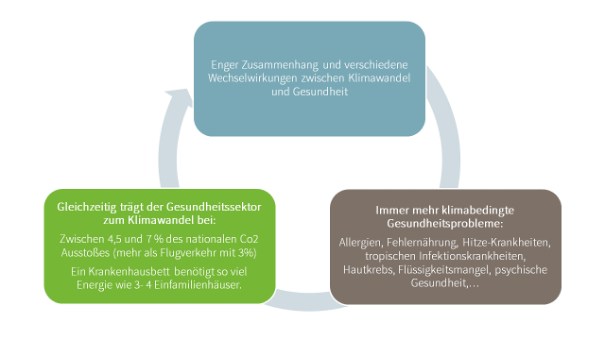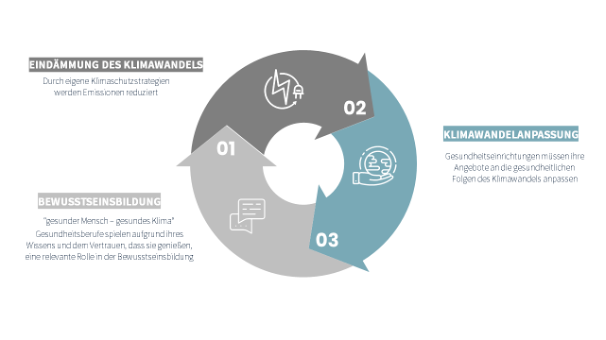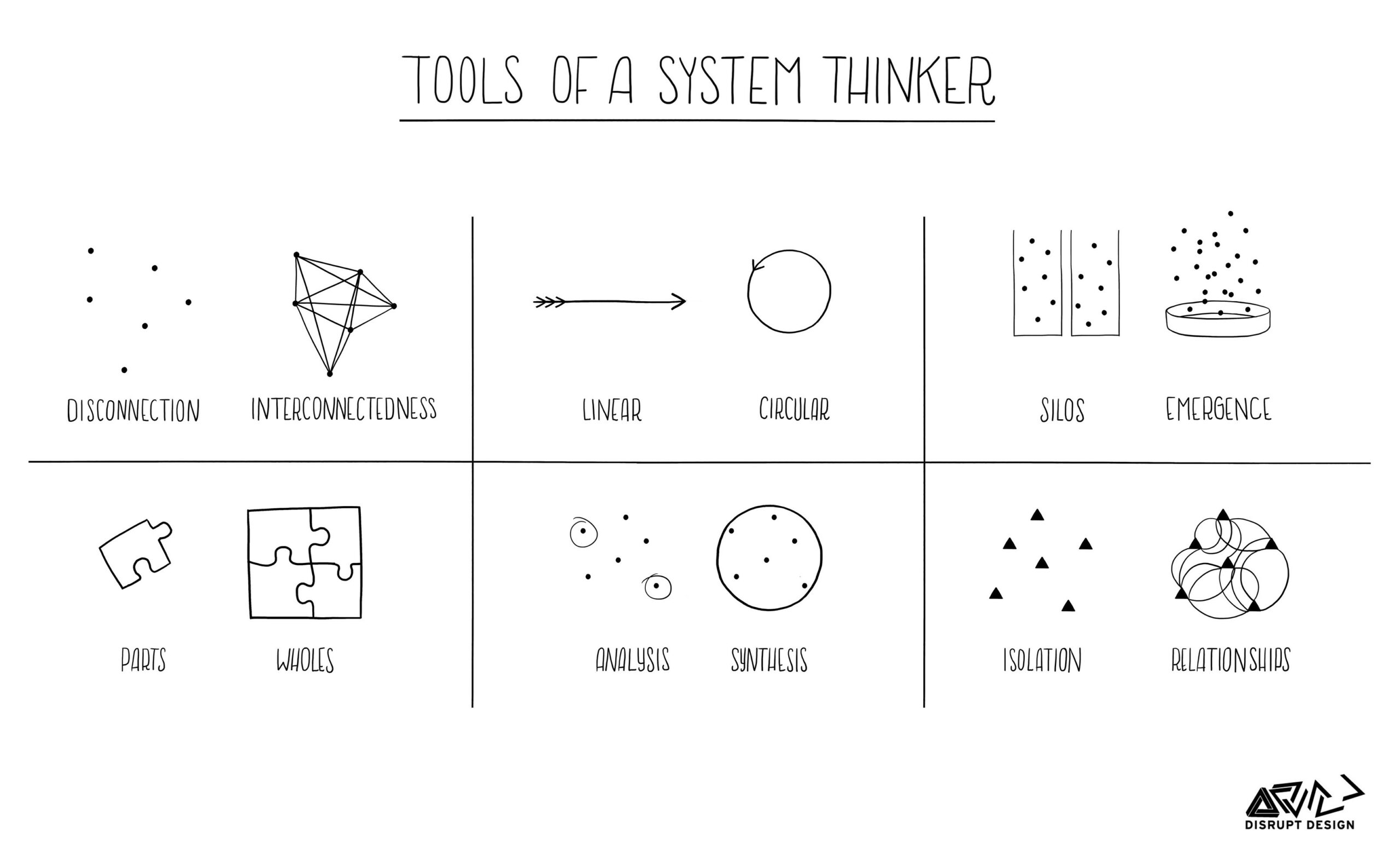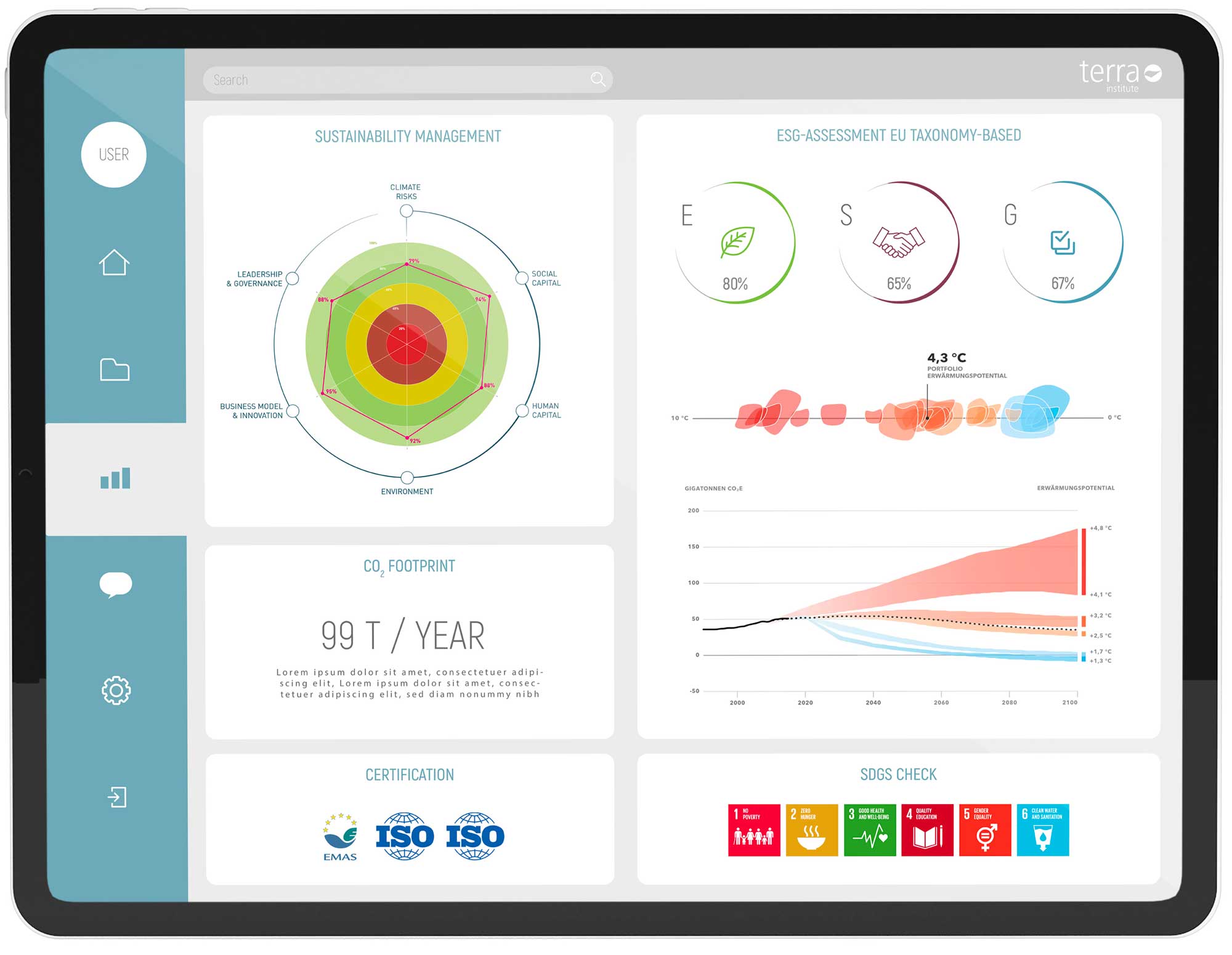Key Takeaways
-
Health and climate change: Climate change has a direct impact on people’s health, e.g. through heat-related illnesses and respiratory diseases. Healthcare facilities must adapt to these challenges and at the same time actively contribute to combating climate change.
- Sustainability as part of healthcare: Hospitals and healthcare facilities play a central role in the ecological transition, e.g. through energy-efficient infrastructure, sustainable purchasing and the reduction of CO2 emissions. Sustainability management is increasingly being integrated into the corporate culture.
3. Regulatory adaptation and transparency: Healthcare organisations must adapt to new legal requirements such as the EU taxonomy and the CSRD. Sustainability reports are important tools for transparently presenting progress and efforts in environmental and social responsibility and using them as a basis for continuous improvement.
HEALTH CARE IN THE FACE OF CLIMATE CHANGE – ‘PLANETARY HEALTH’
GLOBAL WARMING AND ITS IMPACT ON HEALTH
With each WHO report on the ‘greatest threat to humanity’ – climate change – the urgency for the healthcare sector to address the challenges of climate-related health problems grows. These range from heat-related illnesses to the psychological burden of climate anxiety. The medical sector must be prepared to respond to this increasing demand for healthcare services.
The WHO identifies the following relevant points in the development of climate-related illnesses:
- Injuries and deaths due to extreme weather events
- Heat-related illnesses – especially among vulnerable groups
- Respiratory diseases due to air pollution
- Waterborne, foodborne and vector-borne diseases – the spread of dengue alone from previously only a few geographical regions to an occurrence in more than 100 countries is significant
- Changes in the quality and quantity of food and malnutrition – increased weather variability and drought lead to further crop, food and fodder shortfalls, especially in countries with already difficult climate conditions.
Even if the global community succeeds in achieving the 1.5 degree target, there will still be many health impacts that future healthcare systems will have to adapt to.
At the same time, many climate protection measures are associated with health benefits – such as reducing air pollutants, changing eating behaviour and diet, and increasing physical activity.

Fig. 1: The complex context of “planetary health”
RESILIENCE IN HEALTH CARE
Sustainability in the healthcare sector also means promoting resilience to climate change, which is essential for the long-term success of healthcare facilities. The healthcare sector is predestined to play a leading role in this respect and to actively shape social change. Due to the high reputation that healthcare professions enjoy, these institutions are in a unique position to educate and impart knowledge. They can serve as motivators to help people promote and protect not only their personal health, but also the health of our society and environment.
The challenges posed by climate change are manifold and require a comprehensive response from the health sector. It is not only a question of adapting care structures to the new climatic conditions, but also of playing an active role in reducing the impact of climate change and managing the social changes that will inevitably result.
By focussing its strategy on the dimensions of ecological, social and economic sustainability, hospital management is positioning itself strongly for future challenges in the sector. This includes dealing with rising energy costs, which can lead to financial bottlenecks, as well as dealing with the increasing shortage of nursing staff, which is being exacerbated by demographic changes. It also addresses investments in infrastructure renewal to eliminate renovation backlogs, coping with the ongoing consequences of Covid-19 and adapting to the rapid advance of digitalisation and artificial intelligence.
The transformation towards more flexible, diversified management structures and ensuring medical care in rural areas are also on the agenda. Adapting to the EU’s regulatory requirements in relation to sustainability, such as the taxonomy and the Corporate Sustainability Reporting Directive (CSRD), is also important. All of these elements are part of dynamic management that adapts to rapidly changing objectives and thus ensures a future-proof orientation.

Fig. 2: 3 starting points for healthcare facilities
SUSTAINABLE OPERATION AS A RESPONSE TO CLIMATE CHANGE
THE ROLE OF HOSPITALS IN ECOLOGICAL CHANGE
Hospitals contribute 5-7% of the national carbon footprint. They are called upon to strengthen their sustainability strategies, not only through energy-efficient infrastructure and the reduction of anaesthetic gases, but also through the use of telemedicine and the implementation of sustainable nutrition concepts.
Sustainable purchasing” plays a central role in the environmentally conscious management of healthcare facilities. By consciously purchasing products that meet ecological and social criteria, the ecological footprint is minimised. These measures are supported by a sustainability assessment and advice, which ensure that environmental aspects are taken into account in all decisions.

Fig. 3: Relevant fields of action in the healthcare sector
The following sub-areas and corresponding measures can be an initial starting point towards sustainable development:
- Energy-intensive infrastructure – reduction through energy-efficient measures (heating/cooling consumption, hot water and steam treatment, refurbishment of the building envelope, LED use) and utility analyses
- Generation of energy using non-fossil energy sources (heat pumps, PV systems, etc.)
- Promotion of biodiversity by unsealing areas and expanding gardens, green roofs and façades
- Purchasing – climate-friendly procurement criteria, reducing single-use products, cleaning (interval, cleaning agents), laundry (reduction, multiple washing), life cycle calculation of large product groups before purchasing decisions, supply chain management
- Medical treatment itself – reduction of anaesthetic gases through regional anaesthesia, low-flow anaesthesia and anaesthetic gas recovery, use of telemedicine, avoidance of ‘incorrect occupancy’, day-clinic care, prevention of incorrect prescriptions of medication …
- Mobility concepts: reducing induced traffic for employees, patients and visitors (better integration of public transport, carpooling, making cycling more attractive and switching to e-mobility)
- Sustainable nutrition concepts
- Avoidance of waste
- Supply chain management
INTEGRATION OF CIRCULAR ECONOMY AND SUSTAINABILITY LAWS
The concept of the ‘circular economy’ is increasingly becoming an integral part of healthcare providers, as is the adaptation to new legal requirements such as the ‘Supply Chain Act’. These initiatives not only promote the responsible use of resources, but also ensure that the healthcare sector plays its part in the global sustainability goal.
SUSTAINABILITY MANAGEMENT AS PART OF CORPORATE CULTURE
Modern sustainability management in the healthcare sector combines ecological, social and economic issues and leads to a professionalisation that is anchored in all corporate processes – true to the motto ‘Health in all Policies’.
INTEGRATION OF SUSTAINABILITY INTO THE CORE BUSINESS OF HEALTHCARE INSTITUTIONS
Adaptation to legal framework conditions: Increasing regulation, such as the EU taxonomy and the CSRD, is driving healthcare organisations to adapt their strategies. The balance sheet total, net revenue and number of employees are becoming key indicators for sustainability reporting.
Sustainability reports as a basis for transparency and development: ‘Sustainability reports’ serve as an essential tool for presenting progress and endeavours in the area of sustainability. They offer a transparent insight into the ecological balance sheet and social performance of healthcare organisations and are a decisive step towards responsible healthcare management.
Professionalisation through sustainability consulting: Sustainability consulting supports healthcare organisations in developing and implementing effective sustainability strategies. A well-thought-out sustainability report can not only demonstrate an organisation’s commitment, but also serve as a benchmark for continuous improvement.
CONCLUSION: SUSTAINABILITY IN HEALTHCARE
The time to act is now. Because of this high potential impact, no action is no longer an option – let’s start with our sustainability strategies – especially in the healthcare sector – to move ‘from greatest threat to greatest opportunity (Lancet)’. Sustainability is becoming an integral part of corporate strategy.
On the one hand, maximum efforts must be made to curb the rise in global temperatures; on the other hand, strengthening climate resilience and transforming society is a key area in which the healthcare sector can make an impact.
Only through the cooperation of all actors (industry and healthcare sector) can a sustainable change process be initiated.
Autore

Margit Holzhammer. Lawyer, long-time director of a hospital, CSR lecturer at various universities, and CSR and sustainability consultant at Terra Institute. Her focus industries are healthcare, banking, and tourism. Margit heads the Terra office in Innsbruck.











